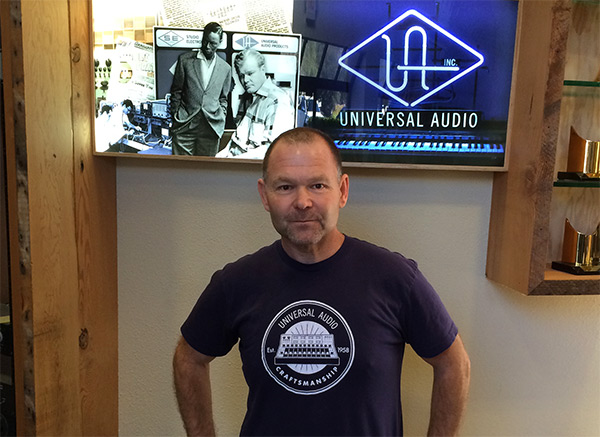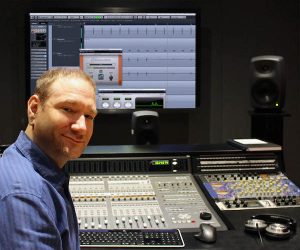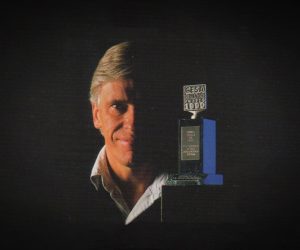
Last Word with Bill Putnam Jnr
with Bill Putnam Jnr,
Founder Universal Audio
Following in the footsteps of his pioneering father, Bill has built a business that provides the highest quality analogue gear for digital people, and digital processing that even analogue die-hards can’t fault.
I don’t think I ever consciously decided to ‘follow in my father’s footsteps’. It was the result of a sequence of things. The first thing my dad did was infect me with a love of music. Even before I really understood what the audio business or recording business was or what recording studios were, he would take me to go see great music.
The first live show he took me to was Duke Ellington. As a kid going into a concert hall, there was something in the atmosphere that was just electric — I could almost touch it.
My dad also introduced me to good sound. Going down to studios, and pulling up the mics in the live room and knowing what that sounds like.
I wasn’t there specifically for an education, but it just happens as a young kid if you’re around great music and great sound.
My dad bought me a radio kit for my 10th birthday and a toolbox, which I still have, and I wrote my name Billy Putnam on it, which is still somewhat legible. It had a soldering iron, a wirecutter, a couple of screwdrivers and a kit called Globe Patrol, which was a radio kit from Radio Shack.
We built a shortwave receiver. I’d climb up a tree and carry this yellow antenna wire. We turned it on and I heard this English voice. It was the BBC and it was like magic — technology was absolute magic.
The best advice my dad gave me was to find a profession you’d probably do regardless of whether you were paid or not. He knew the importance of loving what you do. So much so, it was less advice and more a dictate. Like, this is really what you should do: find that thing and do it — it’s totally possible.
I went to college to study physics, and finally concluded: why am I studying physics? I really want to be an electrical engineer and I really want to do signal processing. I was into my music and I decided I wanted to discover something new about how people hear music and how people enjoy it and relate to it.
I made that decision after my dad had passed away.
My post-grad studies in signal processing were at Stanford — a Ph.D in Electrical Engineering with a wonderful group called CCRMA (we pronounced it ‘karma’) or Center for Computer Research in Music & Acoustics. These days quite a few academic centres take audio and music seriously but back then in the mid-’90s it was mostly taken as a joke.
CCRMA was one of the few places that did take it seriously. And so I was lucky to be at a place that really got into the technology of music.
Stanford is in the Silicon Valley. All my friends wanted to be entrepreneurial and I got that bug. So there was a point when I was deciding if I would spend my life being an academic and teach, or being an entrepreneur and have a business. Finally, I thought, ‘geez I can have it all, I’m gonna go down the business path and I’m gonna find opportunities to teach’. So that was the conscious decision at that point.
Life in business is all about learning from your mistakes and I’ve made every mistake. First lesson: every act of creation has to start with the suspension of disbelief. You have to let an idea live and breathe before you start to poke holes in it; let it grow legs before you think of all the reasons not to do it.
’Cos if you’re a sane person, you would easily and justifiably talk yourself out of any ambitious act. If you knew all the hurdles you’d face beforehand… you wouldn’t do it. Once the idea has a life of its own, then it’s time to shoot holes in it — look at those vulnerabilities and try to fix them. But if you shoot holes at the idea too soon, you’ll never do it. You’ll get talked out of it.
My brother Jim and I had very different opinions about bringing UA into the digital realm. It was the late ’90s and I was very excited about applying the DSP knowledge I’d acquired at college. Digital audio was in its infancy but it represented a world of opportunity. Meanwhile, my brother thought there was no reason to use anything but a great two-inch tape machine, a nice console, and a bunch of outboard equipment. What the heck are you doing? Digital?!
I was convinced a lot of what people were saying about the analogue world was real, but I was also convinced it didn’t have to be that way. I was learning a lot of new techniques and I was determined to apply them to audio processing in such a way that we could make digital capture all the great aspects of analogue. That was the idea in a nutshell. That was the original vision for Universal Audio.
I’m really lucky to have my musical skills. There’s so many great musicians here at Universal Audio. There’s so many great musicians using our equipment. And I still get a vicarious thrill, making something that matters to someone else’s musical process.
I love talking about gear. I do get lost in it. I spend more time talking and thinking about gear than sitting in front of a guitar. But my hope, both personally and for our customers, is we have the gear that allows us to spend more time in the music — allows us to take that idea, that vague concept in our head, and get it out into the world.
















RESPONSES